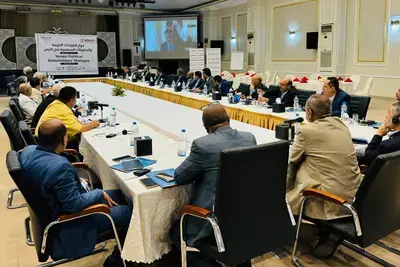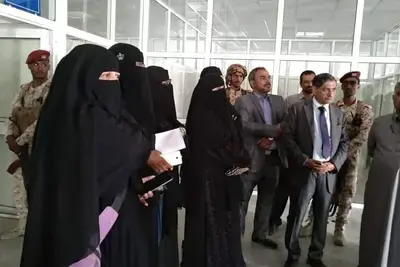
Success Story
Ahead of National Dialogue, NDI Poll Shows that Majority of Yemenis Think Country is Headed in Right Direction
In mid-March, Yemen began its National Dialogue, bringing together political and civil society leaders from diverse political backgrounds to discuss the direction the country will take. As the process gets underway, new public opinion research shows that most Yemenis believe the country is headed in the right direction, though a slim majority in the south disagrees. The conclusions are based on a poll, conducted Jan. 26-Feb. 6, that consisted of 1,486 face-to-face interviews throughout the country.
These results were among topics discussed at a panel discussion at NDI on March 7 held in partnership with the Center for American Progress (CAP). A group of experts explored how average Yemeni citizens view the political transition process and their hopes for the National Dialogue, as well as challenges facing the country through the transition process.
Panelists included Les Campbell, NDI senior associate and regional director for the Middle East and North Africa; Barbara Bodine, former U.S. ambassador to Yemen; and John Moreira, lead consultant for Greenberg Quinlan Rosner Research, who oversaw the public opinion poll. The discussion was moderated by Brian Katulis, a senior fellow at CAP.
The dialogue is a key part of the country’s two-year transition process outlined by a Gulf Cooperation Council (GCC) agreement that resulted from 2011’s citizen-led uprisings. The GCC agreement set guidelines for the democratic transition process leading up to 2014 presidential and/or parliamentary elections. As a result, 565 delegates will meet over the next six months to address such issues as constitutional reform, upcoming elections, improving economic conditions and grievances in southern Yemen.
The dialogue represents an opportunity to rebuild the credibility of the political process in Yemen, where democratic aims have often been stymied by bouts of violence and tension between the North and South, which have struggled to coexist since they unified more than 20 years ago.
“I was struck by a level of optimism that I hadn’t seen for many years,” said Campbell of a recent trip to Yemen, noting consensus among Yemeni political party leaders that the National Dialogue is the way forward for the country’s transition.
“You want to be a little bit careful because you know it can fall apart, but there is this kind of moment that can be captured,” said Campbell of the optimism he observed toward the dialogue process.
According to the poll, Yemeni citizens are most concerned with domestic issues such as jobs, unemployment and corruption, and addressing issues that have contributed to long-standing North-South tensions. Of lesser concern are issues that have been the focus of Yemeni political parties and the international community, including restructuring the military, supporting the National Dialogue and strengthening Yemen’s international reputation.
Bodine noted that despite a general sense that the country is headed in the right direction, there is a lack of trust in institutions and parties. Citizens had little confidence about which parties or institutions are equipped to tackle the major issues facing the country.
“The political landscape is very undefined,” said Moreira. “And it’s an opportunity for the political parties to seize these issues and focus more of their attention on these more material issues to gain support.”
Citizens are largely optimistic about the outcome of the National Dialogue, but there is relatively low awareness about the process among average citizens, with 52 percent having heard little to nothing about the dialogue. Panelists agreed that government communication with citizens about the dialogue and its outcomes is key to having a “Yemeni-owned, Yemeni-driven” process.
“To me the National Dialogue is not going to be an event,” said Bodine. “It’s very much a process, and it’s an open-ended process.”
Related:
Published April 2, 2013



